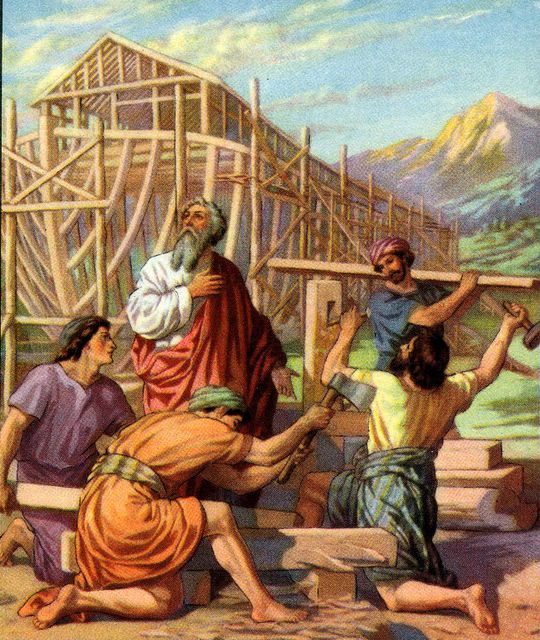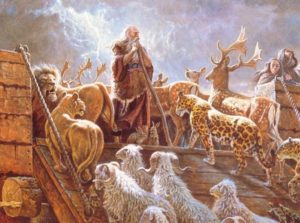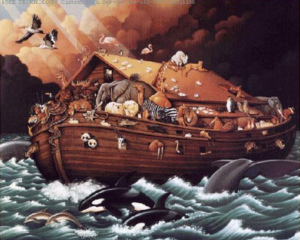Is the flood global or local? This is an issue of intense
debate between young earth creationists and old earth creationists. Young earth
creationists believe the flood described in Genesis 6-9 covered the entire
planet, such that not a single piece of land was left visible, this wiped out
all of humanity except for the few on board the ark. Old Earth Creationists
like myself agree that the flood killed every human being except for Noah and his family,
but disagree that it covered the entire planet. They instead believe that the
flood covered only a large part of the Mesopotamian region, which was the only
part of the world necessary to flood if you wanted all of humankind eliminated
as humanity hadn’t scattered to every corner of the globe. Flooding anywhere
else would have been superfluous. I wrote an article giving several reasons why
I find the local interpretation of the flood more plausible than the global
interpretation in my blog post “Several Reasons Why I Believe A Local Flood Is More Plausible”.
debate between young earth creationists and old earth creationists. Young earth
creationists believe the flood described in Genesis 6-9 covered the entire
planet, such that not a single piece of land was left visible, this wiped out
all of humanity except for the few on board the ark. Old Earth Creationists
like myself agree that the flood killed every human being except for Noah and his family,
but disagree that it covered the entire planet. They instead believe that the
flood covered only a large part of the Mesopotamian region, which was the only
part of the world necessary to flood if you wanted all of humankind eliminated
as humanity hadn’t scattered to every corner of the globe. Flooding anywhere
else would have been superfluous. I wrote an article giving several reasons why
I find the local interpretation of the flood more plausible than the global
interpretation in my blog post “Several Reasons Why I Believe A Local Flood Is More Plausible”.
But one objection that I see consistently raised from the
young earth creationist crowd is the question of why God didn’t just ask Noah
to move if the flood didn’t cover the entire world. It’s a good question. After
all, if the flood didn’t cover the entire planet, Noah had somewhere else to
go. Why not just tell Noah’s family to pack their bags and leave. Evacuation
seems like a more reasonable response to an oncoming flood. Building a massive Ark
and putting all those animals on it, the young earther argues, would only make
sense if the flood engulfed the entire planet, leaving no dry land to move to.
young earth creationist crowd is the question of why God didn’t just ask Noah
to move if the flood didn’t cover the entire world. It’s a good question. After
all, if the flood didn’t cover the entire planet, Noah had somewhere else to
go. Why not just tell Noah’s family to pack their bags and leave. Evacuation
seems like a more reasonable response to an oncoming flood. Building a massive Ark
and putting all those animals on it, the young earther argues, would only make
sense if the flood engulfed the entire planet, leaving no dry land to move to.
First off, I think we could ask similar questions about
other instances in The Bible. Why did God make the Israelites march around Jericho
for seven days prior to the wall falling down? Why did God make the Israelite
look upon the bronze serpent to be healed of snake bite in the wilderness? Why
did Jesus spit on some mud, rub it on the eyes of a blind man, and then tell
him to wash the mud off in the pool of Siloam in order to cure him of
blindness? None of these things were required by God in order for Him to
get His purposes achieved. If we’re going to reject a local flood
interpretation because we don’t understand why God made Noah build an Ark,
we would have to reject the biblical accounts of Jericho’s
fall and the blind man’s healing. Sometimes God does things we don’t
understand. In fact, God didn’t even need to use a flood at all. God could have
made all of the evil people simultaneously have heart attacks and drop dead, or
He could have struck every individual down with lightning, or He could have
done any number of things. We could just as well ask why God didn’t use any of
these potential methods for judging humanity rather than a flood. Obviously God
had reasons for using both a flood and telling Noah to build an ark, even if we
don’t know what those reasons were.
other instances in The Bible. Why did God make the Israelites march around Jericho
for seven days prior to the wall falling down? Why did God make the Israelite
look upon the bronze serpent to be healed of snake bite in the wilderness? Why
did Jesus spit on some mud, rub it on the eyes of a blind man, and then tell
him to wash the mud off in the pool of Siloam in order to cure him of
blindness? None of these things were required by God in order for Him to
get His purposes achieved. If we’re going to reject a local flood
interpretation because we don’t understand why God made Noah build an Ark,
we would have to reject the biblical accounts of Jericho’s
fall and the blind man’s healing. Sometimes God does things we don’t
understand. In fact, God didn’t even need to use a flood at all. God could have
made all of the evil people simultaneously have heart attacks and drop dead, or
He could have struck every individual down with lightning, or He could have
done any number of things. We could just as well ask why God didn’t use any of
these potential methods for judging humanity rather than a flood. Obviously God
had reasons for using both a flood and telling Noah to build an ark, even if we
don’t know what those reasons were.
But we need not appeal to mystery. I think a good reason can
be given for why God told Noah to build the ark in spite of the less than
global extent of the Genesis flood. Reading
through The Bible, the attentive reader will notice a pattern whenever God
unleashes His judgment. Whenever God’s about to open up a can of whoop-butt, he
sends a prophet to warn the people ahead of time, so that they can repent and
possibly avoid God’s judgment. This is because God loves all people (John 3:16) and is “not willing that any should
perish but that all should come to repentance” (2 Peter 3:9). God is love
(1 John 4:8, 1 John 4:16), as such,
He really would rather not judge anyone for their sins, but instead forgive
them, but this is only on the condition of repentance (see Ezekiel 18:23, Ezekiel 33:11). This is why He sends
prophets ahead of time to try to persuade people to repent. For example, God
sent angels to Sodom before it was
to be destroyed (Genesis 19:1), sent Jonah to Nineveh
to warn them of the judgment to come (Jonah 3:3), and will send two prophets to
warn the people of the earth of the final judgment. (Revelation 11:3). The Ark
was a big testimony to the people of Noah’s time that a judgment was coming. Noah
was the messenger of judgment to these ancient peoples.
be given for why God told Noah to build the ark in spite of the less than
global extent of the Genesis flood. Reading
through The Bible, the attentive reader will notice a pattern whenever God
unleashes His judgment. Whenever God’s about to open up a can of whoop-butt, he
sends a prophet to warn the people ahead of time, so that they can repent and
possibly avoid God’s judgment. This is because God loves all people (John 3:16) and is “not willing that any should
perish but that all should come to repentance” (2 Peter 3:9). God is love
(1 John 4:8, 1 John 4:16), as such,
He really would rather not judge anyone for their sins, but instead forgive
them, but this is only on the condition of repentance (see Ezekiel 18:23, Ezekiel 33:11). This is why He sends
prophets ahead of time to try to persuade people to repent. For example, God
sent angels to Sodom before it was
to be destroyed (Genesis 19:1), sent Jonah to Nineveh
to warn them of the judgment to come (Jonah 3:3), and will send two prophets to
warn the people of the earth of the final judgment. (Revelation 11:3). The Ark
was a big testimony to the people of Noah’s time that a judgment was coming. Noah
was the messenger of judgment to these ancient peoples.
This is exactly what The New Testament tells us about Noah”.
“For if God did not spare angels when they sinned, but cast them into hell
and committed them to pits of darkness, reserved for judgment; and did not
spare the ancient world, but preserved Noah, a preacher of righteousness,
with seven others, when He brought a flood upon the world of the ungodly;”
– 2 Peter 2:4-5
“For if God did not spare angels when they sinned, but cast them into hell
and committed them to pits of darkness, reserved for judgment; and did not
spare the ancient world, but preserved Noah, a preacher of righteousness,
with seven others, when He brought a flood upon the world of the ungodly;”
– 2 Peter 2:4-5
If God had Noah and his family evacuate the area, the people
never would had the 100 years of preaching that they did in fact receive. But
God, in His great love for them, had Noah stay and preach to them, trying to
persuade them from their evil so that God would not have to destroy them. The
flood didn’t catch these ancient peoples by surprise. It was prophesied to them
for an entire century. In the end, they had no excuse for their sins. God was
completely fair to them. He gave them 100 years grace to repent, but when those
100 years had come, God, in His righteousness, justly eliminated them.
never would had the 100 years of preaching that they did in fact receive. But
God, in His great love for them, had Noah stay and preach to them, trying to
persuade them from their evil so that God would not have to destroy them. The
flood didn’t catch these ancient peoples by surprise. It was prophesied to them
for an entire century. In the end, they had no excuse for their sins. God was
completely fair to them. He gave them 100 years grace to repent, but when those
100 years had come, God, in His righteousness, justly eliminated them.
Discover more from Cerebral Faith
Subscribe to get the latest posts sent to your email.





